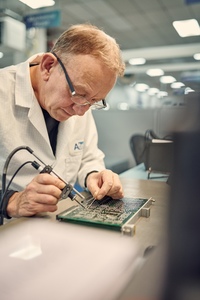

|
Edward Lowton
Editor |


|
| Home> | Plant, Process & Control | >Industry 4.0 | >Digital Starts with Data: A Roadmap for Smarter Manufacturing |
| Home> | Handbooks | >Maintenance Management Guide | >Digital Starts with Data: A Roadmap for Smarter Manufacturing |
Digital Starts with Data: A Roadmap for Smarter Manufacturing
08 September 2025
KEVIN SMITH, lead technology adoption specialist at Made Smarter Adoption, explains why data, not technology, is the real starting point for digital transformation, and how manufacturers can take practical, low-risk steps to unlock long-term growth.

Data is the foundation of digital transformation. Without it, even the most advanced technology is just window dressing. With it, manufacturers gain the insight and agility to boost productivity, reduce waste, and build more resilient businesses. But transformation doesn’t come from simply plugging in new equipment, it requires a structured journey that starts small and grows step by step.
True transformation isn’t about buying the latest shiny tools; it’s about making data work for your business and letting it power everything else.
Many manufacturers are still burdened by paper-based processes, legacy systems, and outdated mindsets. They can’t flick a switch and become digital overnight, but nor can they afford to wait years for complex, high-risk transformation programmes.
A three-stage journey
The key is to break the journey into quick, manageable steps, guided by a clear roadmap.
At Made Smarter, we define that journey in three stages: Digitisation, Digitalisation, and Digital Transformation. These aren’t abstract concepts, they’re proven steps used by hundreds of manufacturers we’ve supported.
A successful journey begins with preparation. For manufacturers, that means embedding lean principles—scrutinising processes, identifying bottlenecks, and eliminating waste. With this foundation, businesses can adopt a culture of continuous improvement, avoid digitising inefficient practices, and create space for smarter, more effective ways of working.
Digitisation: Getting Data In
The first step is digitisation: converting analogue information into digital formats and replacing paper with software.
Data is the lifeblood of digital transformation. When harnessed correctly, it enables smarter, data-led decisions. But digitisation goes beyond paperwork. It captures workforce knowledge, highlights inefficiencies, and builds a digital audit trail full of valuable insight.
For many manufacturers, this starts with tackling the paper trail — spreadsheets, handwritten job sheets, and siloed files that slow everything down.
Atec Engineering Solutions’s journey with Made Smarter began here. The Salford-based business designs and repairs complex electronic and electromechanical equipment for aerospace, defence, nuclear and oil sectors.
Despite having MRP and ERP systems, inconsistent use across departments led to unreliable data and inefficient workarounds. A Made Smarter digital workshop gave Atec the clarity it needed: cleanse and centralise data, fix inaccuracies, and involve the team in the process to overcome cultural resistance to change.
The impact was immediate, not only boosting performance, but also preparing the ground for more advanced technologies.
Digitalisation: Making Data Work
Technology is central to digitalisation, but its real power lies in how it solves operational challenges. The key is to pursue change through focused projects, tackling one issue at a time without losing sight of the bigger picture.
Once data is digitised, the next step is integration: connecting machines, systems, departments, and sites. Cloud platforms and ERP systems lay the groundwork for this infrastructure.
Technologies like sensors and the Industrial Internet of Things (IIoT) enable assets across the shop floor to communicate and generate real-time data - even from older machines - unlocking insights that were previously hidden.
With data flowing, manufacturers can apply analytics, AI, and automation to make faster decisions and improve consistency and productivity.
But these tools only reach their potential when underpinned by good data and a clear operational strategy.
Atec put this into practice by creating a paperless, connected shop floor. Operators used tablets with live dashboards showing MRP/ERP data. No more bulky folders or delays waiting for updates. Engineers could edit and share data instantly, and managers could monitor production in real time.
Some lead times dropped from over a week to just 30 minutes. This wasn’t just about using smart tech, it was about using tech smartly, guided by data and strategy.
Digital Transformation: Embedding a Digital Culture
Once you digitise information and digitalise processes, transformation is about threading digital thinking through your entire organisation: supply chain, customer service, and workforce included.
It requires a strategic plan with clear goals, a roadmap, and performance measures, broken into manageable phases.
Importantly, digital transformation isn’t a one-time event. It’s a continuous process of learning and adapting. And it’s not limited to the shop floor. In fact, back-office functions like HR, payroll, sales and project management are often the first areas to see investment.
To truly transform, leaders must foster a digital culture, one that empowers staff, promotes innovation and collaboration, and rewards adaptability.
At Atec, this meant more than new tech. It meant creating a mindset based on honesty, collaboration, and continuous improvement.
The company questioned old habits, explored new approaches, and looked beyond the factory, integrating supply chain data, improving traceability, and laying the foundation for sustainable growth.
The result? Productivity is forecast to rise by 10%. Major clients like BAE Systems, Rolls-Royce and Boeing have praised the transformation. And Atec is attracting new talent ready to take the business into the future.
The Tools That Unlock the Journey
There’s a common belief that smart factories evolve in a neat line, from sensors to AI to full automation. But real-life manufacturing is rarely that tidy.
At Made Smarter, we know most SMEs don’t have time or resources for a purist approach. Instead, they need the right tool at the right time to unlock the next stage of growth.
For some, that means ERP integration to connect departments. For others, it’s cloud storage, IIoT sensors, or dashboards revealing inefficiencies.
Whatever the tool, data is what gives it meaning. That’s why more than half of the 400 technology projects we’ve supported have focused on unifying data sources and achieving real-time visibility.
With visibility, opportunities multiply. Trends emerge. Quality issues are flagged before they escalate. Risk falls. People are empowered.
The Case for Change
Digital transformation isn’t a destination. It’s a journey that starts with a simple question: Do you trust your data? If not, nothing else matters. But if you do, the possibilities are limitless.
Atec made that leap. With support from Made Smarter, the company turned data from a block into a superpower and transformed its future.
Stories like this drive our mission: helping SME manufacturers unlock the power of digital tools.
With programmes now available in every English region, more manufacturers than ever can take that first step and start putting their data to work.
Because the pace of change is only accelerating. And those who harness their data today will shape the industry of tomorrow.
Made Smarter Adoption
- BEP Surface Technologies slashes energy use by 20% with data-driven project
- Spice Kitchen targets £2m sales and new jobs with tech investment
- Helping SME manufacturers make the most of cobots
- How SME manufacturers are upskilling workers to create the teams of tomorrow
- Made Smarter architect Alain Dilworth awarded MBE in New Year Honours
- Robotics and automation create manufacturing jobs
- Improving maintenance processes through MSIN partnerships
- Technology and digital skills support help SME manufacturers achieve efficiency and innovation
- Emerging technologies used to navigate COVID-19
- Digital transformation confusion risks paralysing SME manufacturers
- Healthy trucks, healthy site
- The Sound of Silence: Communicating with machines
- Inspection, test & monitoring: A choice of career development pathways
- Compressor efficiency: Specification matters
- Raising issues of concern
- Mattei explains why compressor maintenance is essential
- Maintec 2013: Innovation galore
- Co-Locations for Maintec 2014
- Maintaining strategies for success
- Considerations for machine tool maintenance



















